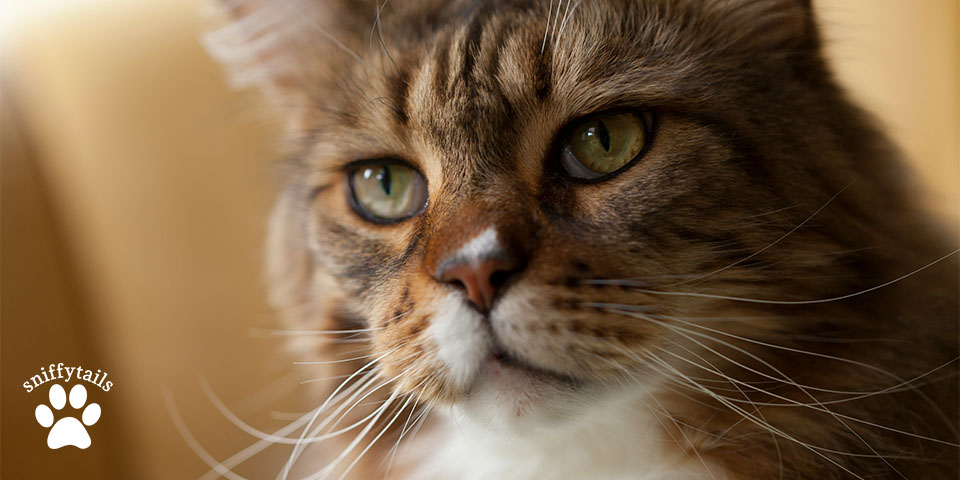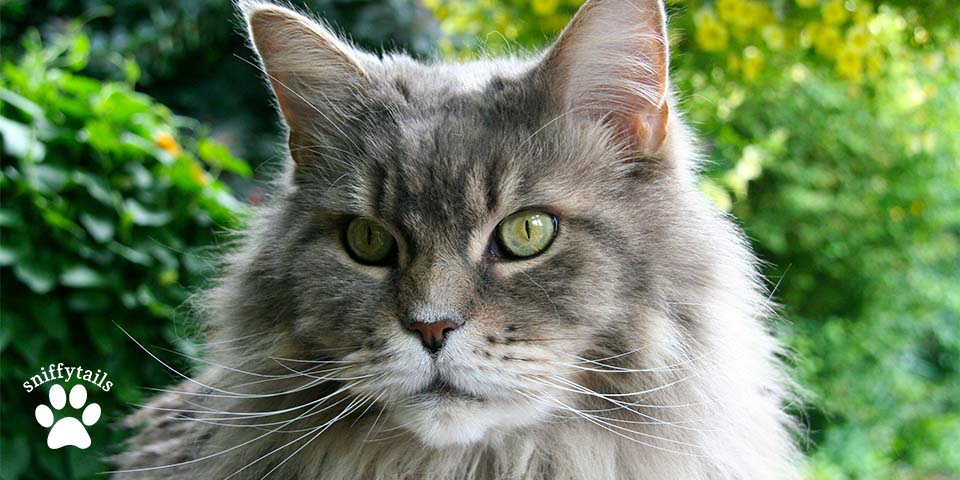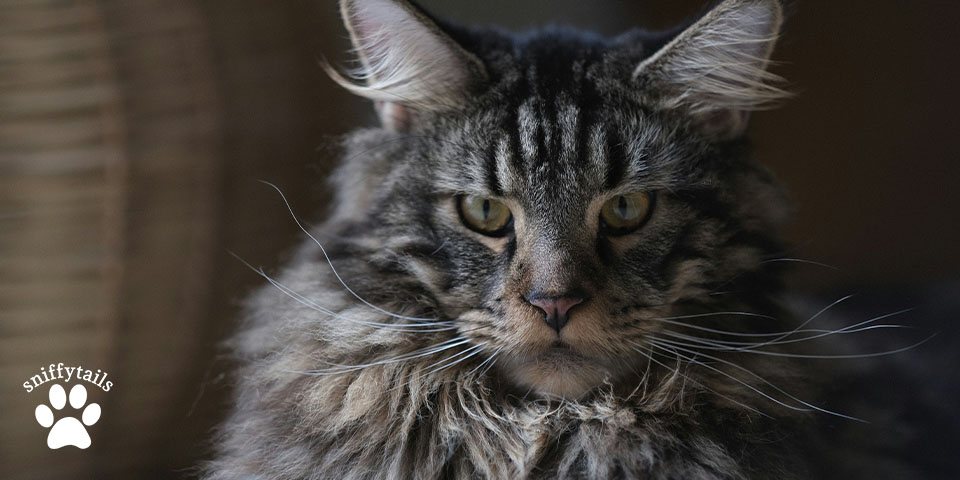How to Care for a Maine Coon
Topics of Our Article
ToggleMaine Coon cats require specific care to stay healthy and happy. Regular grooming is necessary due to their long, thick fur, with brushing at least twice a week to prevent matting. These cats are prone to health issues like hip dysplasia and hypertrophic cardiomyopathy, so regular veterinary check-ups are essential. Their diet should be high in protein and tailored to their size and energy levels to avoid obesity. Providing plenty of interactive toys and opportunities for exercise keeps them mentally and physically stimulated. Additionally, maintaining a clean litter box and monitoring for any changes in behavior or appearance helps detect potential health problems early.
| Attribute | Information |
|---|---|
| Origin | United States (Maine) |
| Size | Large |
| Weight | Males: 13-18 lbs (5.9-8.2 kg), Females: 8-12 lbs (3.6-5.4 kg) |
| Lifespan | 12-15 years |
| Coat Type | Long, thick, water-repellent |
| Coat Colors | Various colors and patterns |
| Eye Colors | Green, gold, copper, blue |
| Personality | Friendly, affectionate, intelligent |
| Temperament | Gentle, playful, sociable |
| Activity Level | Moderate to high |
| Grooming Needs | High (regular brushing) |
| Common Health Issues | Hip dysplasia, hypertrophic cardiomyopathy (HCM), spinal muscular atrophy (SMA) |
| Ideal Living Conditions | Adaptable to various environments, indoor or outdoor access preferred |
| Good With Children | Yes |
| Good With Other Pets | Yes |
| Training | Responsive to training, enjoys interactive play |

What Should You Know About the Maine Coon?
Breed Overview
The Maine Coon is one of the largest domesticated cat breeds, known for its majestic appearance and affectionate personality. Originating from the northeastern United States, specifically Maine, this breed is well-adapted to cold climates, sporting a thick, water-repellent fur coat and tufted ears. Maine Coons have a muscular build, long bushy tails, and expressive eyes, contributing to their striking look. Their coats come in a variety of colors and patterns, making each Maine Coon unique. This breed is known for its intelligence and playful nature, often compared to dogs due to their loyal and friendly demeanor.
Long-haired cat care is essential for maintaining their beautiful coats, which require regular grooming to prevent matting and tangling. Additionally, understanding large cat breed characteristics helps in providing the right environment and care. Maine Coons are also one of the friendly cat breeds, enjoying social interaction with their human families and other pets. Their intelligence makes them responsive to training and interactive play, which are key aspects of Maine Coon care tips.
Temperament
Maine Coons are famous for their gentle and friendly temperament. They are sociable cats that enjoy the company of humans and other pets, making them great family companions. Known as the “gentle giants” of the cat world, Maine Coons are affectionate without being overly demanding. They are typically curious and playful, enjoying interactive playtime and mental stimulation. Despite their large size, Maine Coons are known for their soft voices and often communicate through a series of chirps and trills. They are also known for their adaptability, making them suitable for various living environments, from apartments to large homes.
Friendly cat breeds like the Maine Coon thrive in households where they receive ample attention and affection. Their adaptable nature and intelligence make them easy to train and integrate into different living situations. Understanding intelligent cat breeds can help owners provide the mental stimulation these cats need to stay happy and healthy.

What Is the Best Nutrition and Diet for a Maine Coon?
Recommended Feeding Schedule
Providing a proper nutrition and diet for a Maine Coon is crucial to ensure their health and longevity. Maine Coons, being one of the largest domesticated cat breeds, require a balanced diet that supports their muscular build and energy levels. A recommended feeding schedule involves two to three meals per day. It’s important to provide high-quality cat food rich in protein, which helps maintain their muscle mass and overall health. Wet food can be included to ensure they get enough hydration, as Maine Coons can be prone to urinary issues.
Maine Coon diet tips include:
-
- High-protein food: Look for food with real meat as the first ingredient.
-
- Controlled portions: Avoid overfeeding to prevent obesity.
-
- Regular mealtimes: Consistency helps in digestion and metabolism.
Avoiding Obesity
Obesity in Maine Coons can lead to various health issues such as diabetes, joint problems, and heart disease. To avoid obesity, it is essential to monitor their food intake and ensure they get regular exercise. Here are some Maine Coon care tips to keep your cat at a healthy weight:
-
- Measure portions: Use a measuring cup to feed your cat the right amount of food based on their weight and activity level.
-
- Limit treats: Treats should make up no more than 10% of their daily caloric intake.
-
- Encourage activity: Interactive toys and climbing structures can help keep your Maine Coon active and engaged.
-
- Scheduled feeding: Stick to a regular feeding schedule and avoid free-feeding.
How Much Exercise Does a Maine Coon Need?
Exercise Requirements
Maine Coons, known for their active and playful nature, require a significant amount of exercise to maintain their health and prevent obesity. Due to their large size and muscular build, these cats need more physical activity than the average house cat. A general recommendation is to provide at least 30 minutes of exercise daily. This can be broken up into multiple short sessions throughout the day. Regular exercise helps in maintaining their muscle tone and overall well-being.
Key exercise requirements include:
-
- Interactive play: Use toys that stimulate their hunting instincts, like feather wands and laser pointers.
-
- Climbing: Provide cat trees and shelves to encourage climbing and jumping.
-
- Mental stimulation: Puzzle toys and interactive feeders can keep their minds engaged.
Activity Ideas
Keeping a Maine Coon active is essential for their physical and mental health. Here are some activity ideas to help meet their exercise needs:
-
- Fetch games: Many Maine Coons enjoy playing fetch, similar to dogs.
-
- Tunnels and boxes: Create an obstacle course with tunnels and boxes for them to explore.
-
- Outdoor exploration: If safe, let your Maine Coon explore a secured yard or take them for walks on a leash.
-
- Interactive toys: Automated toys and laser pointers can provide hours of entertainment.
These activities not only provide physical exercise but also mental stimulation, which is crucial for such an intelligent breed.
Avoiding Overexertion
While exercise is important, it is equally crucial to avoid overexertion, especially in younger or older Maine Coons. Overexertion can lead to injuries and stress. Here are some tips to ensure your Maine Coon gets the right amount of exercise without overdoing it:
-
- Monitor play sessions: Keep an eye on your cat during playtime and ensure they are not panting or showing signs of exhaustion.
-
- Gradual increase: If your cat is not used to regular exercise, gradually increase the duration and intensity of play sessions.
-
- Provide rest: Ensure your Maine Coon has access to comfortable resting areas where they can relax and recuperate after play.
By balancing activity with rest, you can help maintain your Maine Coon’s health and happiness. These Maine Coon care tips are essential for providing the best possible care for your pet.

How Do You Groom a Maine Coon Properly?
Brushing Frequency
Grooming a Maine Coon properly involves regular brushing to maintain their long, luxurious fur. Due to their thick double coat, Maine Coons are prone to matting and tangling. It is recommended to brush them at least two to three times a week to keep their coat in good condition. Regular brushing helps to remove loose hair, reduce shedding, and prevent hairballs. Additionally, it is important to use the right tools, such as a wide-toothed comb and a slicker brush, to effectively manage their fur. Regular brushing is a key part of long-haired cat care and helps maintain their beautiful coat. Best brushing practices for Maine Coons include being gentle to avoid hurting their sensitive skin and making the experience enjoyable for the cat.
Bathing Practices
While Maine Coons do not require frequent baths, occasional bathing can help keep their coat clean and healthy. It is generally recommended to bathe your Maine Coon every four to six weeks. Use a gentle cat shampoo that is specifically formulated for long-haired breeds to avoid drying out their skin. Bathing not only cleans their fur but also helps to reduce allergens and dander. Be sure to thoroughly rinse and dry your Maine Coon to prevent any skin irritation. Knowing how to bathe a Maine Coon properly involves using lukewarm water and ensuring a stress-free environment. Using the best cat shampoo for Maine Coons will help maintain their fur’s health, and understanding the Maine Coon bathing frequency ensures their coat remains in optimal condition.
Ear and Dental Care
Maintaining proper ear and dental care is crucial for the overall health of your Maine Coon. Check their ears weekly for signs of dirt, wax buildup, or infection. Use a vet-approved ear cleaner to gently clean their ears if necessary. Dental hygiene is equally important; brushing your Maine Coon’s teeth at least two to three times a week can prevent plaque buildup and dental diseases. Use a toothbrush and toothpaste designed specifically for cats to ensure safety and effectiveness. Regular ear cleaning for Maine Coons helps prevent infections, while dental care tips for Maine Coons include using enzymatic toothpaste to reduce plaque. Keeping up with Maine Coon oral hygiene ensures your cat remains healthy and happy.
What Are the Common Health Issues in Maine Coons?
Importance of Regular Vet Visits
Regular vet visits are crucial for maintaining the health of a Maine Coon. These check-ups help in early detection of potential health issues, ensuring timely treatment and management. It is recommended to schedule vet visits at least once a year, although more frequent visits may be necessary for older cats or those with chronic conditions. During these visits, vets can perform routine examinations, administer vaccinations, and offer advice on diet and care. Preventative care for Maine Coons is essential to ensure they live long, healthy lives. This includes regular screenings for common health problems and keeping up with vaccinations.
Common Health Issues
Maine Coons are generally healthy cats, but they are prone to certain genetic conditions. One common issue is hip dysplasia, a condition where the hip joint does not fit into the hip socket properly, causing pain and mobility issues. Another prevalent condition is hypertrophic cardiomyopathy (HCM), a heart disease that thickens the heart walls and can lead to heart failure. Additionally, Maine Coons can suffer from spinal muscular atrophy (SMA), a genetic disorder affecting muscle function. Awareness of these conditions and regular health checks can help manage and mitigate their impact.
Common health issues in Maine Coons include:
-
- Hip dysplasia
-
- Hypertrophic cardiomyopathy (HCM)
-
- Spinal muscular atrophy (SMA)
Preventative Care
Preventative care is vital in managing and reducing the risk of health problems in Maine Coons. This includes maintaining a healthy diet, ensuring regular exercise, and monitoring their weight to prevent obesity. Routine dental care is also important to avoid periodontal disease. Vaccinations are crucial to protect against infectious diseases, and parasite control is necessary to prevent infestations of fleas, ticks, and worms. Regular grooming can help detect skin issues early. Implementing these Maine Coon care tips ensures your cat stays healthy and happy.
Effective preventative care involves:
-
- Balanced diet and proper nutrition
-
- Regular exercise and weight management
-
- Routine dental care
-
- Up-to-date vaccinations
-
- Parasite prevention and control
-
- Regular grooming
How Do You Train and Socialize a Maine Coon?
Effective Training Tips
Training a Maine Coon involves patience, consistency, and positive reinforcement. Maine Coons are highly intelligent and can learn various commands and tricks. Start with basic commands like sit, stay, and come. Use treats and praise to reward good behavior, making training sessions enjoyable and rewarding for your cat. Clicker training is also effective, as it helps reinforce positive behavior through sound association. Maine Coons respond well to interactive play, which can be incorporated into their training routine to keep them engaged and mentally stimulated.
Effective training tips for Maine Coons include:
-
- Positive reinforcement: Reward-based training encourages good behavior.
-
- Short sessions: Keep training sessions short to maintain their attention.
-
- Consistency: Use consistent commands and rewards for best results.
Training a Maine Coon with basic training commands like sit and stay, using clicker training, and reward-based training are excellent strategies.
Socialization
Socializing a Maine Coon is crucial for their development and well-being. Early socialization helps them adapt to different environments, people, and other pets. Expose your Maine Coon to various stimuli, such as new sounds, sights, and experiences, from a young age. Gradually introduce them to new people and animals to build their confidence and reduce fear. Positive interactions during this period will help them grow into well-adjusted, sociable cats.
Socialization tips for Maine Coons:
-
- Early exposure: Introduce them to different environments and experiences early on.
-
- Positive interactions: Ensure new experiences are positive and stress-free.
-
- Gradual introductions: Slowly introduce them to new people and pets to build confidence.
Socializing Maine Coons with other pets, ensuring early socialization for kittens, and building confidence in Maine Coons can make them more adaptable and friendly.
Addressing Behavioral Challenges
Maine Coons, like all cats, can develop behavioral issues. Common challenges include scratching furniture, excessive meowing, and litter box problems. Address these issues with patience and positive reinforcement. Provide scratching posts to deter furniture scratching and use deterrent sprays if necessary. Ensure they have a clean and accessible litter box to prevent litter box issues. If excessive meowing occurs, identify and address the underlying cause, such as hunger, boredom, or medical issues.
Addressing behavioral challenges in Maine Coons involves:
-
- Providing alternatives: Use scratching posts and toys to redirect unwanted behavior.
-
- Identifying causes: Understand the reasons behind behaviors like excessive meowing.
-
- Positive reinforcement: Reward good behavior to encourage desirable actions.
To stop Maine Coons from scratching furniture, address excessive meowing in Maine Coons, and solve litter box issues effectively, provide alternatives and understand the underlying causes.

Conclusion
Proper care, training, and socialization of your Maine Coon are essential to ensuring they grow into well-behaved and happy cats. Regular grooming, a balanced diet, and plenty of exercise help maintain their health and well-being. Effective training with positive reinforcement and early socialization can make your Maine Coon adaptable and friendly. Addressing behavioral challenges with patience and understanding is crucial. By following these guidelines, you can provide the best care for your Maine Coon, fostering a strong bond and a fulfilling life for your pet.